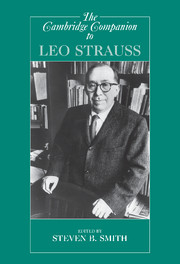Book contents
- Frontmatter
- 1 Introduction: Leo Strauss Today
- 2 Leo Strauss: The Outlines of a Life
- 3 Leo Strauss and the “Theologico-Political Predicament”
- 4 Strauss’s Recovery of Esotericism
- 5 Strauss’s Return to Premodern Thought
- 6 Leo Strauss and the Problem of the Modern
- 7 The Medieval Arabic Enlightenment
- 8 “To Spare the Vanquished and Crush the Arrogant”: Leo Strauss’s Lecture on “German Nihilism”
- 9 Leo Strauss’s Qualified Embrace of Liberal Democracy
- 10 Strauss and Social Science
- 11 The Complementarity of Political Philosophy and Liberal Education in the Thought of Leo Strauss
- 12 Straussians
- Bibliography
- Index
- Series List
8 - “To Spare the Vanquished and Crush the Arrogant”: Leo Strauss’s Lecture on “German Nihilism”
Published online by Cambridge University Press: 28 November 2009
- Frontmatter
- 1 Introduction: Leo Strauss Today
- 2 Leo Strauss: The Outlines of a Life
- 3 Leo Strauss and the “Theologico-Political Predicament”
- 4 Strauss’s Recovery of Esotericism
- 5 Strauss’s Return to Premodern Thought
- 6 Leo Strauss and the Problem of the Modern
- 7 The Medieval Arabic Enlightenment
- 8 “To Spare the Vanquished and Crush the Arrogant”: Leo Strauss’s Lecture on “German Nihilism”
- 9 Leo Strauss’s Qualified Embrace of Liberal Democracy
- 10 Strauss and Social Science
- 11 The Complementarity of Political Philosophy and Liberal Education in the Thought of Leo Strauss
- 12 Straussians
- Bibliography
- Index
- Series List
Summary
Few political theorists are more controversial today than Leo Strauss. Strauss has been called an enemy of liberal democracy and its champion, a Nietzschean atheist and a believing Jew, a retiring scholar and the intellectual inspiration behind current efforts to democratize the Middle East by force. There is no denying that Strauss began his scholarly career as a staunch critic of Weimar liberalism. A student of Edmund Husserl and Martin Heidegger and associate of Karl Löwith, Gershom Scholem, and others, Strauss came of age at a time of radical challenge to liberal political and intellectual positions generally. Strauss later observed that in that German postwar atmosphere, Oswald Spengler and Karl Jünger were widely admired and Nietzsche's influence deeply felt. (As Strauss later told Löwith, Nietzsche so “bewitched” him between his twenty-second and his thirtieth year that he literally believed everything that he could understand.) Strauss's youthful aversion to the assimilationist path that had been followed by an earlier generation of liberal German Jews (an aversion he shared with figures such as Walter Benjamin and Gershom Scholem), combined with his early exchanges with Carl Schmitt, whom he accused of remaining too beholden to liberal thinking, have cemented Strauss's reputation among some as a lifelong opponent of liberal ideas.
- Type
- Chapter
- Information
- The Cambridge Companion to Leo Strauss , pp. 171 - 192Publisher: Cambridge University PressPrint publication year: 2009
- 6
- Cited by

